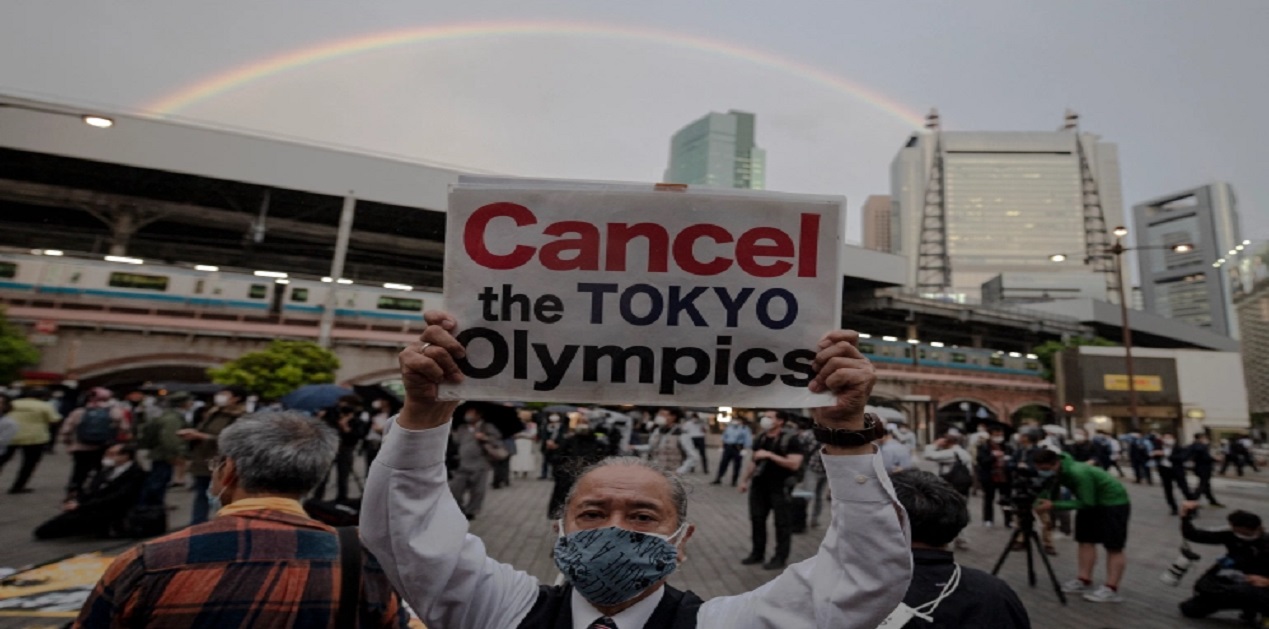At the time of writing, the Tokyo Olympics are on but there is a strong case for its cancellation in view of the extraordinary situation before it is too late as lives are at stake. The ferocity of the rampaging pandemic shows no signs of ebbing out anytime soon with successive ugly waves taking away too many people world over. More worrying is that new variants emerging from many countries and travelling fast beyond borders are posing peculiar new threats. Though many countries around the world have come up in developing vaccines to protect the peoples, vaccinating all the peoples is a herculean task. The prevailing situation makes a strong case for the Tokyo Olympics Games to be cancelled as there could be several imponderables for which the world is unprepared to face at the moment.
When the long-awaited Olympics was postponed from July 2020 to July 2021, Sir Keith Mills, who was the former chief executive of the Summer 2012 Games, had expressed doubts that the Games in Tokyo will go on as planned in 2021.1 The main argument then and also even now is that the pandemic has not ebbed and therefore the time is inopportune for hosting the Games. He urged the Suga government to pull the plug on the Games as the infections were not localised but could be super-spreader affecting many countries participating in the Games. It thus transpired that doubts were cast many months back if the Games were going to be viable. In particular, the Paralympics, involving athletes with medical conditions could be put to extra risk, it was argued.
Despite that Covid protocols such as physical distancing, no human touch or use of marks were to be maintained, there are certain games such as wrestling or judo that entail physical contacts where such protocols have to be compromised.
Yet, disrespecting mounting domestic public opinions as reflected in several opinion polls, and despite a strong editorial in the popular Asahi Shimbun on 26 May 20212 exhorting Suga for a rethink, the Prime Minister Suga has risked his political future and has decided to go ahead with the Games. For record, recent Kyodo News poll showed that a whopping 80 per cent are against Japan holding the Games. Even, the influential Taro Kono and seen as a competitor for Suga’s present post expressed reservations on the government’s determination to go ahead with the Games. After the Games were postponed from last year, costs have escalated by 22 per cent. There are also invisible costs such as on security and renegotiating the contracts. The cost of cancellation insurance is another bother. Now it seems, the Suga administration is waiting for the last minute with the hope that the pandemic situation shall improve. But then the vaccination issue remains to be addressed fully and it involves vaccine procurement, storage, distribution, arranging medical professionals to administer the vaccines, prioritising the section of the people to be vaccinated and many more related issues.
Announcing the cancellation at least a month prior to the event to begin would be cruel to those aspiring to competing in the Games. True, it would be a terrible blow for their toil and hard work planning for a podium finish if the Games are cancelled but then the Game is not one-time event in life. If some would miss this time, there can always be another chance after four years and there shall always be new competitors. So, the show should go on but not this time because of the extraordinary situation. Have not the Games been cancelled in on three previous occasions: in 1916, 1940 and 1944, each time because of world wars, and has the Games become less important? The spirit of Citius, Altius, Fortius shall never diminish if the greatest show on Earth this time in Tokyo is not held. Already, under the shadow of Covid-19, the locals are wary, athletes on the edge, trainings truncated, restrictions extensive and if a final cancellation decision is stretched further, it would smack of political immaturity and high-risk gamble, playing with peoples’ lives. Can the Suga government guarantee the safety of peoples’ health and that the event would not end up as a super-spreader? If it ends up that way, Tokyo Games would have been the greatest example of human folly in post-War history of which Suga would go down as its biggest architect.
If the Games are held, Tokyo would have assembled more than 11,000 athletes from more than 200 countries. Japan still maintains restrictions on international flights allowing people to enter Japan. Does it have time to re-jig this with enough conditions in place? It does not look like possible. Yet, Japan’s Olympic Minister Seiko Hashimoto whose selection to this office was hailed as sign of women empowerment says the Games must go “at any cost”. That statement sounds too arrogant as plenty of insurmountable tasks have to be addressed with too little time left. Thus, the decision to go ahead with the Games appear for admirers and friends of Japan from the outside as unreasonable, unconvincing, irrational and even treacherous to the Japanese people. It is time for Suga for a rethink.
Hashimoto reasons that the foreign athletes shall have a first-hand exposure to learn about the culture of the host country, and that she has planned online events about Japanese culture. One might ask, is it the appropriate time to sell such an idea? For an average reader, Hashimoto’s argument shall be laughable at the best. The news that each athlete shall be provided with 14 condoms but would not be allowed to use them, though can take home as souvenir is just laughable. Does it mean athletes go the event to compete or to look for sex? Such news is just bizarre to the human imagination. The image of the event is going to be tarnished, nevertheless, when such news appear.
Then the International Olympics Committee (IOC) President Thomas Bach says that further postponements are not an option. Does he understand what risks he is exposing to Japan as the situation is quite abnormal this time? True, Japan would incur huge loss as the investments are big. But what if the extravaganza ends up with heavy human casualty in terms of virus spread; can Bach get back those who could perish in the pandemic? These are serious issues that cannot be buried under the carpet. The argument that the prestige and limelight attached to Japan and Tokyo would be lost if the Games are cancelled pale into insignificance as compared to the risks involved in hosting the Games.
On 4 January, Suga claimed that to host the Games would mean that “humanity has defeated the virus”. Now it appears how immature that statement was as in the next five months there has been a dramatic turnaround in the virus spread, necessitating declaration and further extension of the emergency. Further, imposition of the emergency and getting peoples’ compliance is not the same in Japan as in other countries as per the Japanese law.
Kosuke Takahashi of Janes Defence Weekly argues that the main reasons why the Games must be cancelled are rapid spread of the virus, limited global vaccine rollout and rising costs of hosting the Games.3 Further, there is worry about dealing with new variants discovered in many countries that have overwhelmed the health care facilities in many countries, including Japan. According to Worldmeter, as of 7 June 2021, there have been 760, 323 infected case with 13, 523 deaths and this is rising. And this nightmarish experience is just not confined to Japan but has overwhelmed every corner of the globe. Suga’s optimism seems therefore misplaced. Moreover, this optimism is dismissed by the people as various opinion polls reveal where as much as 80 per cent of people want the Games to be cancelled. With less than six weeks for the Games to start, too many gaps have to be plugged. That is not possible. With over 11,000 athletes and support staff converging in Tokyo, the Tokyo Olympics could turn Japan into a world super-spreader. What would be at stake is Japan’s image before the world. The pride and glory, as expected by Suga, would be replaced by ignominy that Japan would carry through history. Is that a desirable option?
There has been a steady rise in the graph of public disapproval about the Games since December 2020 with the disapproval rate rising from 63 per cent in December to over 80 per cent in May 2021. The people are also unwilling to share a burden of the skyrocketing price tag, which has reached more than 3 trillion yen ($29 billion), the most expensive Summer Olympics in history.
The astronomical costs for Japan, if the staggering 307 trillion yen released towards the coronavirus-related economic stimulus equivalent to 60 per cent of Japan’s GDP are added to the cost for Olympics, would be mind-boggling. This figure is already the highest among the G-7 nations. The national budget deficit is further going to be widened. Has Suga or his finance minister considered this aspect?
One of Japan's sporting heroes and a member of the local Olympic committee, Kaori Yamaguchi, a judo medallist, said Japan had been "cornered" into pressing ahead with the 2020 Games despite public opposition during the coronavirus pandemic. According to her, Japan already missed the opportunity to cancel and “cornered into a situation where we cannot even stop now. We are damned if we do, and damned if we do not”.4
Suga seems trapped in the Olympics chakravyuh and unable to get out. He cannot overlook the interests of the sponsors such as Toyota Motor, Cola-Cola and other major companies from whom huge sponsorship money has been collected. Suga is also interested to protect the interest of Dentsu, the marketing agent for the Olympics whose image would be tarnished in the event of the Games cancellation. The clock is ticking fast for Suga and he must take the right decision before it is too late.
Endnotes
- Patricia Claus, “Tokyo Olympics Should be Cancelled, London Organiser Says,”, 21 January 2021, https://greekreporter.com/2021/01/21/tokyo-olympics-should-be-cancelled-london-organizer-says/
- “Prime Minister Suga, please call off the Olympics this summer”, Asahi Shimbun, editorial, 26 May 2021, http://www.asahi.com/ajw/articles/14357907
- Kosuke Takahashi, “Why the Tokyo Olympics must be cancelled”, 22 January 2021, https://asia.nikkei.com/Opinion/Why-the-Tokyo-Olympics-must-be-canceled
- “Japan 'cornered' into holding Games, says local Olympian”, 4 June 2021, https://www.rediff.com/sports/report/japan-olympic-committee-board-member-blasts-tokyo-games-oc/20210604.htm
(The paper is the author’s individual scholastic articulation. The author certifies that the article/paper is original in content, unpublished and it has not been submitted for publication/web upload elsewhere, and that the facts and figures quoted are duly referenced, as needed, and are believed to be correct). (The paper does not necessarily represent the organisational stance... More >>
Image Source: https://www.aljazeera.com/wp-content/uploads/2021/05/000_9A68MT.jpg?resize=770%2C513











Post new comment